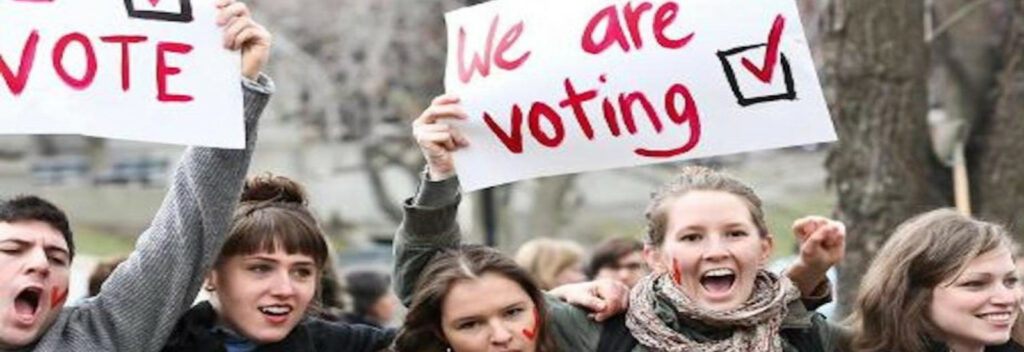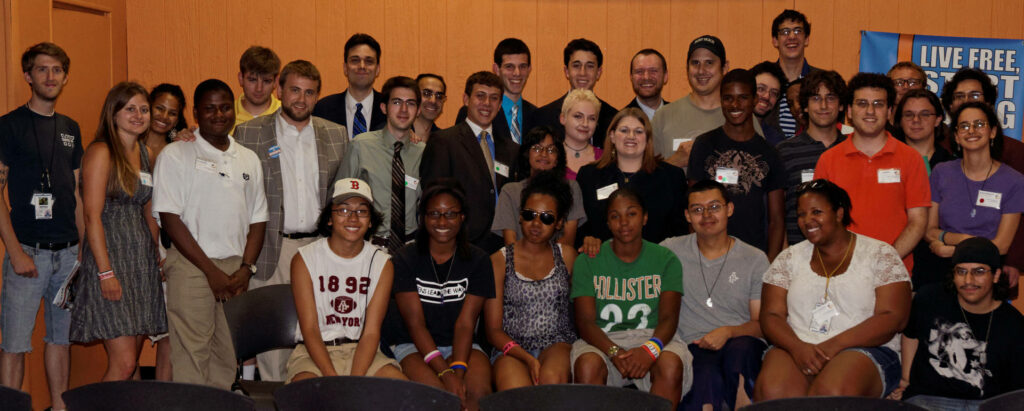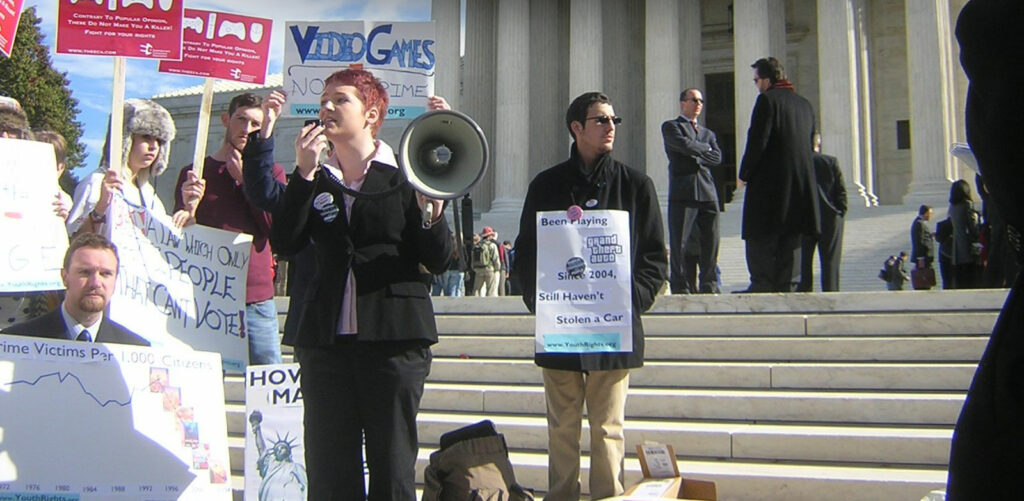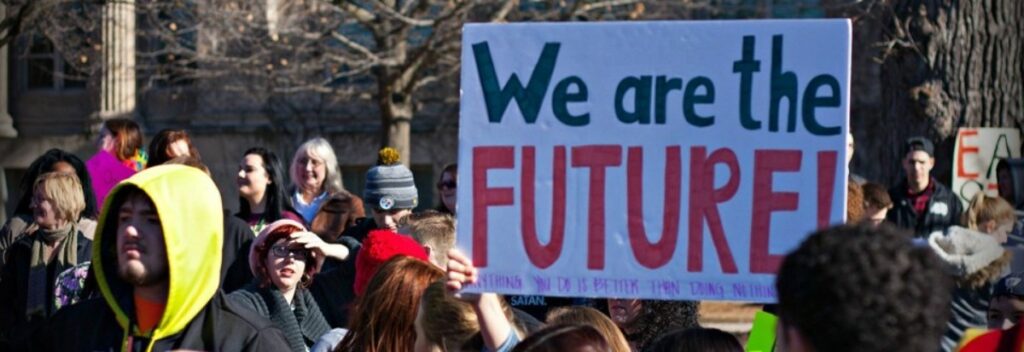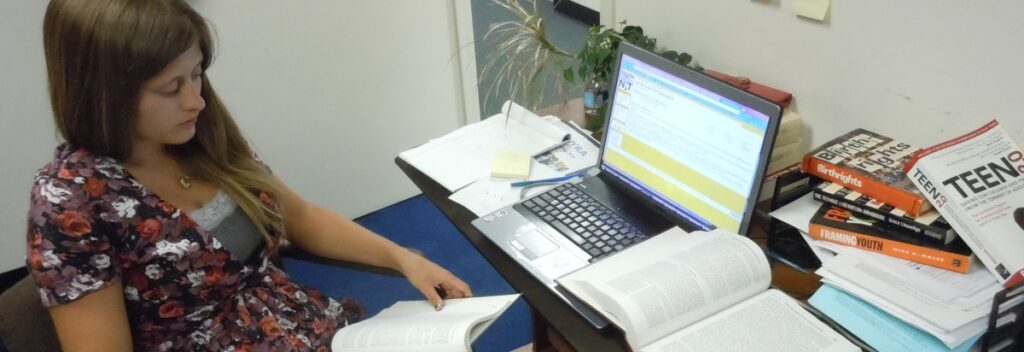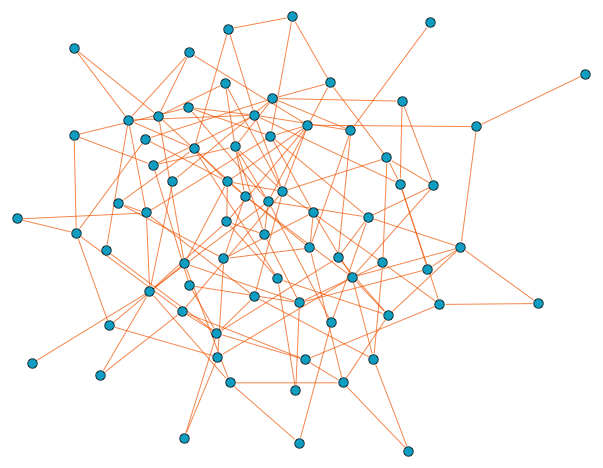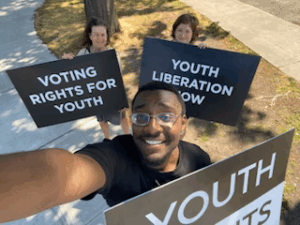“I believe the time has come to lower the voting age in the United States, and thereby to bring American youth into the mainstream of our political process. To me, this is the most important single principle we can pursue as a nation if we are to succeed in bringing our youth into full and lasting participation in our institutions of democratic government.” – Sen. Ted Kennedy
Just like the earlier movement to lower the voting age to 18, the current campaign is part of a decades-long struggle for young people to gain political power. Join us, check out the current campaigns, and be a part of history.
Pre-1971
Activists campaigned for nearly thirty years to lower the voting age from 21 to 18. They eventually achieved success with the passing of the Twenty-sixth Amendment to the Constitution which prevents any state from having a voting age above 18 years old.
1989-2015
Minnesota: In 1989, State Representative Phyllis Kahn (DFL-Minneapolis) proposed to lower the voting age to 12. Despite opposition, Kahn continued fight for youth rights and co-authored numerous bills to lower the voting age to 16 in 1991, 1999, 2001, 2004 (to age 17), 2007, 2007 (for school elections only), 2009, 2012, and two more in 2015 for state and local elections and for school elections only.
1995
California: Assemblymember Jackie Speier (D-South San Francisco) proposed a bill that would lower the voting age to 14.
1999-2002
Massachusetts: A group of students at Cambridge Rindge and Latin School calling themselves Campaign for a Democratic Future, began campaigning to lower the voting age to 16 for local elections in the city of Cambridge. Cambridge City Council members approved a petition to the state legislature asking for permission to lower the voting age for city council and school committee elections to 16. It was later amended to reduce the voting age to 17 and failed 6-3. It was introduced again in 2002 and passed 8-1. The bill was sent to study by the state legislature and failed to meet the filing deadline.
2000
Washington, D.C.: NYRA held one of the first Lower the Vote rallies on Election Day, in Franklin Park calling attention to the disenfranchisement of young people.
Michigan: NYRA-Ottawa County was one of the first local NYRA chapters to launch a campaign to lower the voting age.
2001-2003
Texas: State Representative Ron Wilson (D-Houston) proposed lowering the state’s voting age to 14 in state and local elections. The bill was later amended to hold a non-binding referendum on lowering the voting age to 16. This bill made it out of Committee, but was not voted on. Two years later, Wilson introduced a similar bill lowering the state’s voting age to 16. The bill stalled in the Elections Committee.
2003
Alaska: The Youth Civic Rights Movement proposed a ballot measure to lower the voting age to 16 in Anchorage. The proposal failed by a single vote in the Anchorage Assembly, but an advisory vote to lower the voting age was placed on the ballot. It was defeated by the voters.
Florida: High school student Miranda Rosenberg sought to get a proposal to lower the voting age to 16 on the state ballot. Rosenberg was not able to obtain the 489,000 signatures required.
Iowa: Student Anne Craig campaigned to lower the voting age to 14. Three different bills were introduced in the legislature both during that year and the next, but none of them were successful.
Maine: State Representative Glenn Cummings (D-Portland) proposed a bill to lower the voting age to 17. The bill was amended to only allow 17-year-olds to vote in primary election if 18 by general election, which passed.
Maryland:
- Baltimore Mayor Sheila Dixon campaigned to lower the municipal voting age to 16.
- NYRA-DC sought to put a referendum to lower the Voting Age in Takoma Park to 16 on the ballot. It failed to get enough signatures.
Pennsylvania: State Senator Jack Warner (D-Allegheny) sponsored a resolution urging Congress to lower the voting age in Pennsylvania to 17. The bill stalled in State Government Committee.
2004
California: State Senator John Vasconcellos (D-Santa Clara) proposed one-quarter vote for fourteen year-olds and one-half vote for sixteen year-olds. The bill was amended after being approved by two committees to instead allow people 16 years of age and older a full vote in state elections. It was later abandoned due to lack of support.
Minnesota: State Senator Steve Kelley (DFL-Hopkins) proposed a bill lowering the voting age to 17. The proposal passed its first committee, but was re-referred and stalled.
2005
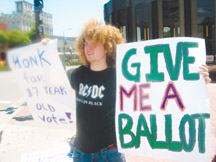
NYRA-Berkeley Members held several protests to lower the voting age.
California:
- NYRA-Berkeley and Berkeley City Councilmember Kriss Worthington submitted a proposal that would have allowed voters to decide if 16 and 17-year-olds should be eligible to vote in local elections. The proposal failed 4-5.
- NYRA-Berkeley also worked on lowering the voting age in San Francisco, and on July 12, 2005 the San Francisco Board of Supervisors passed a resolution 8-2 urging the California legislature to pass a bill that will allow any city or county to lower its local voting age to 16.
Massachusetts: A proposal to lower the voting age to 17 for local elections was submitted by the Cambridge Kids Council’s youth involvement subcommittee and passed the City Council. It required permission from the State Legislature which evolved into a bill sponsored by State Representative Alice Wolf (D-Cambridge), but the bill stalled in a committee with no hearing.
Minnesota: Seventeen-year-old NYRA member Jesse L. Hunter attempted to vote as a protest, but was mistakenly given a ballot and allowed to vote. The first known time someone under 18 was allowed to vote in the US in a general election. He was later charged with felony voter fraud before having the charges dropped in response to NYRA objections.
New York: Future Voters of America and Councilwoman Gale Brewer (D-Manhattan), introduced a bill in the New York City Council to lower the city voting age to 16. The bill failed to move forward.
Washington: NYRA-Olympia members and three State Representatives proposed a bill to amend the constitution to lower the voting age to 16 for all elections.The bill stalled in the State Government Operations & Accountability Committee.
2007
Massachusetts: Students at Harwich High School began a campaign to get a 16-year-old voting age on the ballot in Massachusetts. Despite receiving help from a variety of other schools and colleges, proposal failed to get the 66,593 required signatures by December 5th deadline.
2008
Arizona: State Representative Ed Ableser (D-Tempe) introduced a constitutional amendment that would lower the voting age in the state to 16. Proposal stalled awaiting first reading.
Florida: NYRA-Southeast Florida began a campaign to lower the voting age to 16 in Florida elections. The chapter held rallies on election day, met with state legislators and created a commercial making their case for a lower voting age.
Illinois: State Representative Lou Lang (D-Skokie) introduced a state Constitutional Amendment to lower the voting age to 17. The bill passed committee, but was tabled and then stalled.
Michigan: State Senator Michael Switalski (D-Roseville) introduced legislation to allow 16-year old students to vote in local school board elections. The bill stalled in the Committee on Campaign and Election Oversight.
2009
Minnesota: State Senator Sandra Pappas introduced a bill to lower the voting age to 16, which stalled in committee.
Wisconsin: A resolution to lower the voting age to 17 was introduced by five State Representatives. The bill stalled in committee.
2010
Massachusetts: Young people from the United Teen Equality Center in Lowell campaigned to lower the voting age to 17 for local elections. Lowell City Councillors voted 8-1 in favor of sending a Home Rule Petition to the state legislature to allow Lowell to lower its voting age for municipal elections. A bill sponsored by State Representative Kevin J. Murphy (D-Lowell) cleared several hurdles, and finally stalled before a third reading.
2011
Connecticut: A group called The New 18 campaigned to lower the voting age to 16 in the city of New Haven. The New Haven Board of Aldermen’s Youth Services Committee voted in favor of asking the full Board of Aldermen to send a non-binding referendum to local voters to ask the state to lower the voting age to 16. The proposal failed to get sufficient votes by the full Board.
Washington: NYRA-Seattle members persuaded Washington State Senator Scott White (D-Seattle) to introduce legislation to lower the voting age to 17 for school board elections in the state.The bill stalled in the Early Learning & K-12 Senate Committee.
2013
Maryland: Takoma Park councilman, Tim Male, introduced a measure to lower the municipal voting age to 16. On May 13, 2013 the measure passed the city council on a vote of 5-1 before a packed auditorium of local youth, NYRA members and other supporters. The first 16-year-old in US history to cast a legal vote in a general election occurred on November 5, 2013.
2014
Maryland: Inspired by the success in nearby Takoma Park, Hyattsville city council member Patrick Paschall introduced a bill to lower the voting age in city elections. After a brief campaign by NYRA members and other supporters the bill passed on January 12, 2015 with a vote of 7 to 4. Sixteen and seventeen-year-olds voted in the city election on May 5, 2015.
Missouri: State Representative Karla May (D-St.Louis) filed a joint resolution to amend the state constitution to reduce the voting age to 16 for state and local elections. The bill stalled in the House Elections Committee.
2015
Arizona: Nine State Representatives introduced a bill to lower the voting age to 16. It died in committee.
Washington, D.C.: After meeting with local NYRA activists, three DC Councilmembers introduced the Youth Vote Amendment Act of 2015 to lower the voting age to 16 in all elections. The bill stalled in committee.
Hawaii: Eight State Representatives sponsored a bill to lower the voting age to 16 for state and local elections. The bill died in committee.
Maryland: After two Montgomery County Councilmembers expressed support for lowering the voting age, a Maryland state bill was introduced that would allow the county to lower its voting age for school board elections. It passed the Education Committee and the House Delegation Committee, but stalled in the Ways and Means Committee.
Massachusetts: A group of young people in North Andover petitioned to lower the voting age to 16 in local elections. Town meeting residents voted against the measure.
New Mexico: State Representative Javier Martínez (D-Albuquerque) introduced a bill lowering the voting age to 16. The bill stalled in committee with 16 sponsors.
Vermont: Brattleboro resident and activist Kurt Daims proposed to lower the voting age to 16 for local elections. Brattleboro voters rejected the proposal at their annual town meeting.
2015-2018
Maryland: Greenbelt’s Youth Advisory Committee proposed two separate advisory ballot measures to lower the voting age to 16. When the second one passed, the Committee was able to persuade the City Council to lower the voting age which it did on January 8, 2018, making Greenbelt the third city in the U.S. with a voting age of 16.
2016
Arizona: A bill to lower the voting age to 16 was introduced in the state legislature. It died in committee with 11 co-sponsors.
California:
- California Assemblywoman Lorena Gonzalez (D-San Diego) proposed a constitutional amendment to allow all Californians aged 16 and older to vote in their local school board and community college district governing board elections. The bill died in committee with 8 sponsors.
- Vote16SF and other youth rights activists successfully put a measure on the ballot – Proposition F – to lower the voting age in San Francisco for local elections. Voters voted on the measure on November 8, 2016. The proposition earned more than 172,000 votes to finish at 48%, just shy of the 50% threshold needed to pass.
- Berkeley students and other activists put a referendum on the ballot to lower the voting age to 16 for school board elections. The measure passed with 70% of the vote.
- The Richmond Youth Council explored drafting a bill to lower the voting age for local elections.
- The Fairfax Town Council voted unanimously to establish a subcommittee to coordinate community discussion and on lowering the voting age to 16 for local ballot measures. The Council conducted a feasibility study with the goal of placing a measure on the November 2017 ballot, but the proposal stalled.
Maryland: The Glenarden City Council voted to lower the voting age to 16 for local elections, making it the third town in U.S. history to have a voting age of 16. Unfortunately, a newly elected council reversed the decision a year later.
Nevada: Activists worked on a campaign to lower the voting age to 16 for school board elections.
New Jersey: NYRA-Hudson County launched a campaign to lower the voting age to 16 in Jersey City. A motion to lower the voting age was introduced to the Jersey City Council, but was defeated 7-2.
Texas: NYRA chapter Texas Vote16 began a campaign to get representatives in the Texas legislature to introduce a bill to lower the voting age to 16 throughout the state, but failed to get enough support.
2017
California: Assemblymember Evan Low introduced Assembly Constitutional Amendment (ACA) 10 which would lower the voting age from 18 to 17. The bill failed to get enough support.
Florida:
- NYRA Board Member and NYRA-Broward County Chapter Leader, Elijah Manley submitted a proposal to lower the voting age in Broward County to 15, but the proposal stalled.
- Florida activists also campaigned to lower the voting age to 16 for school board elections throughout Florida.



